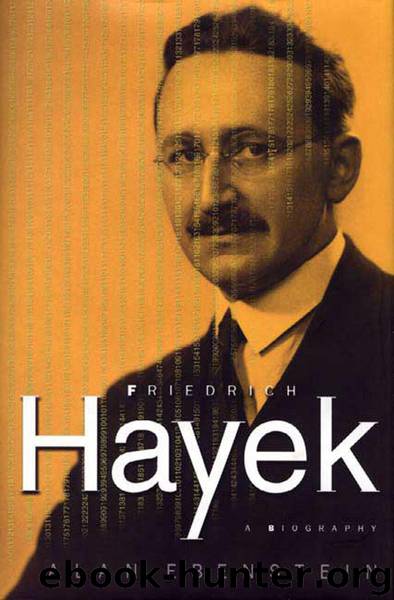Friedrich Hayek: A Biography by Alan Ebenstein

Author:Alan Ebenstein [Ebenstein, Alan]
Language: eng
Format: epub
Publisher: St. Martin's Press
Published: 0101-01-01T00:00:00+00:00
CHAPTER TWENTY-SIX
Influence
INFLUENCE IS SO DIFFICULT TO MEASURE. Hayek quoted Mill approvingly in The Constitution of Liberty on the “‘lesson given to mankind by every age, and always disregarded—that speculative philosophy, which to the superficial appears a thing so remote from the business of life and the outward interest of men, is in reality the thing on earth which most influences them.’”1 He himself wrote in Monetary Nationalism and International Stability that “I regard it not only as the privilege but as the duty of the academic economist to take all alternatives into consideration, however remote their realisation may appear at the moment.”2 He concluded The Counter-Revolution of Science, “I doubt whether it is possible to overestimate the influence which ideas have in the long run.”3 He stated in “Why I Am Not a Conservative” that the “task of the political philosopher can only be to influence public opinion. He will do so effectively only if he is not concerned with what is now politically possible.”4 He approvingly quoted G. Mazzini in Law, Legislation and Liberty that “Ideas rule the world and its events. A revolution is the passage of an idea from theory to practice.”5 He himself wrote in Denationalisation of Money that the “chief task of the economic theorist or political philosopher should be to operate on public opinion to make politically possible what today may be politically impossible.”6
Among his favorite lines were those of Keynes’ closing to The General Theory, where Keynes asked of his work there, “Is the fulfillment of these ideas a visionary hope? It would need a volume of a different character from this one to indicate even in outline the practical measures in which they might be gradually clothed. But if the ideas are correct—an hypothesis on which the author himself must necessarily base what he writes—it would be a mistake, I predict, to dispute their potency over a period of time. The ideas of economists and political philosophers, both when they are right and when they are wrong, are more powerful than is commonly understood. Indeed the world is run by little else. Practical men, who believe themselves to be quite exempt from any intellectual influences, are usually the slaves of some defunct economist. Madmen in authority, who hear voices in the air, are distilling their frenzy from some academic scribbler of a few years back. I am sure that the power of vested interests is vastly exaggerated compared with the gradual encroachment of ideas.… Soon or late, it is ideas, not vested interests, which are dangerous for good or evil.”7
Hayek said in The Constitution of Liberty that “the belief that in the long run it is ideas and therefore the men who give currency to new ideas that govern evolution have long formed a fundamental part of the liberal creed.”8 He also held there that “so far as direct influence on current affairs is concerned, the influence of the political philosopher may be negligible. But when his ideas have become common property,
Download
This site does not store any files on its server. We only index and link to content provided by other sites. Please contact the content providers to delete copyright contents if any and email us, we'll remove relevant links or contents immediately.
International Integration of the Brazilian Economy by Elias C. Grivoyannis(108036)
The Radium Girls by Kate Moore(12012)
Turbulence by E. J. Noyes(8037)
Nudge - Improving Decisions about Health, Wealth, and Happiness by Thaler Sunstein(7689)
The Black Swan by Nassim Nicholas Taleb(7098)
Rich Dad Poor Dad by Robert T. Kiyosaki(6596)
Pioneering Portfolio Management by David F. Swensen(6280)
Man-made Catastrophes and Risk Information Concealment by Dmitry Chernov & Didier Sornette(6001)
Zero to One by Peter Thiel(5782)
Secrecy World by Jake Bernstein(4737)
Millionaire: The Philanderer, Gambler, and Duelist Who Invented Modern Finance by Janet Gleeson(4457)
The Age of Surveillance Capitalism by Shoshana Zuboff(4272)
Skin in the Game by Nassim Nicholas Taleb(4232)
The Money Culture by Michael Lewis(4186)
Bullshit Jobs by David Graeber(4177)
Skin in the Game: Hidden Asymmetries in Daily Life by Nassim Nicholas Taleb(3986)
The Dhandho Investor by Mohnish Pabrai(3751)
The Wisdom of Finance by Mihir Desai(3726)
Blockchain Basics by Daniel Drescher(3571)
